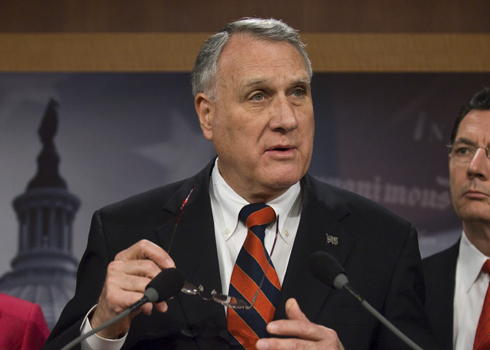Democrats today are shopping around what they’re saying is a really juicy (if totally predictable) tale of Republican hypocrisy: Just days after the Senate GOP caucus imposed a voluntary moratorium on earmarking, Sen. Jon Kyl (R-AZ) dumped $200 million in extra cash for his home state into a spending bill right before final passage.
But experts insisted to TPM today that what Kyl did isn’t nearly as clear or egregious as the AP made it out to be.
Here’s the AP story Democrats are so excited about:
Only three days after GOP senators and senators-elect renounced earmarks, Arizona Sen. Jon Kyl, the No. 2 Senate Republican, got himself a whopping $200 million to settle an Arizona Indian tribe’s water rights claim against the government. Kyl slipped the measure into a larger bill sought by President Barack Obama and passed by the Senate on Friday to settle claims by black farmers and American Indians against the federal government.
There it is: Kyl put extra spending for his home state into a bill that went beyond what was originally requested. “Earmark!” the Democrats are shouting, followed almost immediately by, “Hypocrite!” (It should be noted that Democrats are deeply divided over earmarking, with Obama calling it a bad thing and most Democrats in Congress saying the practice is worthwhile).
So is Kyl’s $200 million an earmark? Other Republicans have already tried to redefine what exactly constitutes an earmark in the wake of the GOP ban — like Rep. Michele Bachmann (R-MN), who said that “advocating for transportation projects for one’s district in my mind does not equate to an earmark.” Sen. Saxby Chambliss (R-GA) also tried to carve out some earmark exceptions for himself.
Two anti-earmark watchdogs I spoke with today took something of a similar line — saying that what Kyl did isn’t earmarking in the official sense. But, one suggested, that may not matter as much as Kyl might hope it does.
“There’s a lot of nuance and any comment you include from [us] should note that,” Taxpayers for Common Sense vice president Steve Ellis told me. “We’re into earmark shades of grey.”
Sen. Patrick Leahy (D-VT) didn’t see any nuance when he attacked the additional money added by Kyl. Here’s what he said, according to the AP:
“I do know an earmark when I see it. And this, my friends, is an earmark,” Leahy said in a prepared floor statement. He said Kyl’s project would help the White Mountain Apaches “make snow at their ski resort, improve water flow to their casino and build fish hatcheries to improve local fish production.”
“Those projects don’t appear to be directly funded by the bill,” the AP reports, “though the measure’s wording is confusing.”
Ellis said Leahy and the Democrats jumping on Kyl today may actually be jumping the gun instead.
“Despite Sen. Leahy’s gleeful protestations to the contrary, there’s no way Congress (Republican or Democrat) would consider this an official earmark — too much money,” he told me. The government was going to have to pay the Arizona tribe at some point, Ellis said, so “so Uncle Sam was going to be coming up with the cash whether or not Sen. Kyl got it in,” Ellis said.
Ellis’ group is vehemently anti-earmark, and he said that last year’s federal budget had “$6 billion worth of provisions we considered an earmark that Congress did not.” Kyl’s addition to the settlement bill “leads you down the earmark path,” Ellis said, but he added, “I don’t think this would violate the Senate GOP moratorium, because that is based on the Senate earmark definition.”
Citizens Against Government Waste, a conservative-leaning anti-earmark group whose distaste for the practice equals Taxpayers for Common Sense, didn’t see the nuance that Ellis did. President Tom Schatz told me that what Kyl did wasn’t an earmark — in fact, he said it didn’t even raise any hackles with his crew at all.
“Not from an earmarking standpoint, no,” Shatz said. He added that Indian settlements are a “special issue” that need to be “dealt with.”
“The Indian [settlement] stuff is complicated,” he said. But whether what Kyl did ran afoul of the CAGW’s 100% opposition to earmarking is less complicated, Schatz said.
“Nope,” he said flatly. He pointed to the fact that the bill containing the additional funds passed the Senate unanimously (by voice vote) as evidence that Kyl’s addition didn’t violate the GOP earmark ban. Senators like Tom Coburn (R-OK) and Jim DeMint (R-SC) — who are leading the charge against earmarking in the Senate — would have raised the alarm if Kyl’s additional funds broke the GOP’s new rules, he said.
Despite the fact that Kyl may not have violated the letter of the earmark moratorium, conservatives who are pushing for an end to earmarks may still see what Kyl did as a violation of the spirit of the ban. A Maine tea party leader told Slate‘s Dave Weigel that Kyl’s $200 million addition sounded like an earmark to him, and that was enough for him to join the Democrats in raising the hypocrisy flag.
“Absolutely bloody daft,” the tea partier told Weigel. “[Kyl] seems to be keen to back away from GOP promises faster than the did in ’94. If there is an example of why the tea party movement needs to keep a keen eye on the GOP this is it.”
Update: Ellis from Taxpayers for Common Sense emails that though Kyl’s addition to the settlement bill is not technically an earmark by Congressional definition, it will more than likely appear in the TCS’ undisclosed list of earmarks the group keeps every year.
“It would probably end up in our earmark database,” he said.
“It was authorized and appropriated at the same time, it wasn’t in the presbud, was done at the behest of a lawmaker, and was added on to (largely) separate legislation,” Ellis added. “We do a lot of analysis before we compile our undisclosed list but this seems like a likely candidate.”






